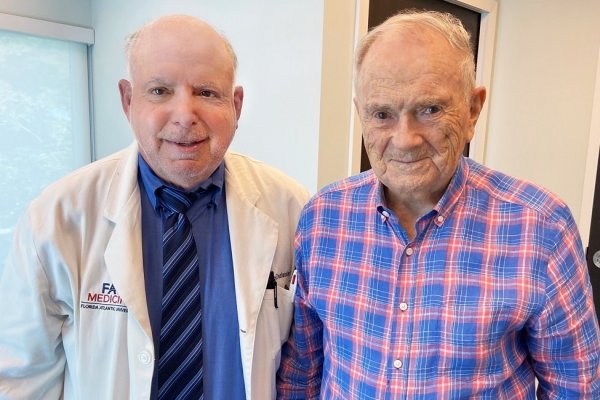Joseph G. Ouslander, M.D.
Professor of Geriatric Medicine Florida Atlantic University
- Boca Raton FL
Joseph Ouslander, M.D., is an internationally recognized geriatrician and a leader in the advancement of quality care for older adults.
Social
Biography
Areas of Expertise
Accomplishments
Health Care Innovation Hero
Palm Beach County Medical Society ’s 18th Annual Heroes in Medicine Awards
2021
Champion Award
National Association for Continence
2003
Career Leadership Award
National Institute on Aging
2001 - 2005
Polisher Award for Applied Gerontological Research
2000
Education
Case Western Reserve University
M.D.
1977
John Hopkins University
B.A.
1973
Affiliations
- Journal of the American Geriatrics Society : Executive Editor
Selected Media Appearances
Commentary: Overly intensive diabetes and blood pressure care endangering frail older adults
McKnight’s Long-Term Care News online
2025-08-20
A new commentary published in the Journal of the American Geriatrics Society warns that thousands of frail older adults across the United States are being harmed daily by overly aggressive treatment of diabetes and hypertension. The paper, led by Florida Atlantic University geriatric medicine professor Joseph G. Ouslander, MD, calls for “urgent change” in how healthcare providers manage chronic conditions in vulnerable seniors.
Avoidable All-Cause Hospitalization, ED Visits Common in Nursing Homes
HealthDay online
2025-08-04
Joseph G. Ouslander, M.D., from the Charles E. Schmidt College of Medicine at Florida Atlantic University in Boca Raton, and colleagues conducted a secondary analysis of a trial that implemented a 12-month quality improvement program to reduce potentially avoidable hospitalizations (PAH) and emergency department visits of NH residents.
Study Refutes Blood Thinner Brain Bleed Risk After Fall
Newsmax online
2025-08-01
While blood thinners are widely thought to increase the risk of dangerous brain hemorrhages following trauma, new research from Florida Atlantic University suggests this risk may be overstated.
Most Nursing Home Patient Hospital Visits Avoidable
Newsmax online
2025-07-28
Dr. Joseph G. Ouslander, senior author and professor of geriatric medicine at Schmidt College of Medicine said, “These are conditions we know how to manage better in nursing homes, using existing guidelines, care paths and preventive strategies. With the right tools and staffing, many of these hospital transfers could be avoided, reducing both resident suffering and unnecessary healthcare costs.”
Terminally Ill Nursing Home Patients Face Needless ER Visits, Hospital Stays
U.S. News & World Report online
2025-07-28
These health problems “highlight some clear, actionable opportunities to improve care,” senior researcher Dr. Joseph Ouslander said in a news release. He’s a professor of geriatric medicine at Florida Atlantic University’s Schmidt College of Medicine in Boca Raton.
80% of ER Visits by Terminally Ill Nursing Home Residents Deemed Avoidable
Skilled Nursing News online
2025-07-28
“These are conditions we know how to manage better in nursing homes, using existing guidelines, care paths and preventive strategies,” said Dr. Joseph Ouslander, senior researcher for the study and professor of geriatric medicine at Florida Atlantic University’s Schmidt College of Medicine in Boca Raton, said in a news release. “With the right tools and staffing, many of these hospital transfers could be avoided, reducing both resident suffering and unnecessary health care costs.”
Selected Articles
Strategies to Reduce Iatrogenic Hypoglycemia and Hypotension in Vulnerable Older Adults
Journal of the American Geriatrics Society2025
Overtreatment of diabetes mellitus and hypertension resulting in iatrogenic hypoglycemia and hypotension are especially common in vulnerable older adults and can result in excess morbidity, mortality, and health care costs. In this article, we review the prevalence of these conditions and the incidence of their complications. We recommend that physicians who provide primary and specialty care, as well as advanced practice practitioners (nurse practitioners and physician associates) who write prescriptions and orders for these treatments be incentivized to avoid these harms through carefully designed quality measures (QMs) and other strategies. We list several general and specific recommendations for strategies that we believe have the potential to reduce the incidence of iatrogenic hypoglycemia and iatrogenic hypotension and related complications in vulnerable older adults. Collaboration among health care organizations and facilities, health policy makers, professional organizations, individual health care providers, researchers, and patients will be essential in achieving this potential.
Announcing a New Section in JAGS on Artificial Intelligence and Technology
Journal of the American Geriatrics Society2025
JAGS Remains Committed to Scientific Principles That Support Better Health and Function for All Older Adults: Disparities, Diversity in Research, and Respectful Discourse
Journal of the American Geriatrics Society2025
Diagnoses Associated With Hospitalization of Nursing Home Residents With Severe Functional Impairment and Terminal Illness
Journal of the American Medical Directors Association2025
Editing geriatric medicine journals: perspectives from the editors-in-chief of Age and Ageing, European Geriatric Medicine and the Journal of the American Geriatrics Society
European Geriatric Medicine2025






